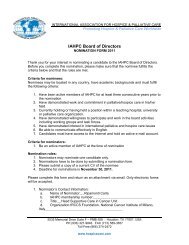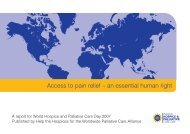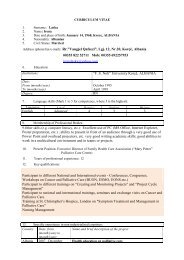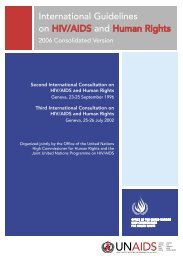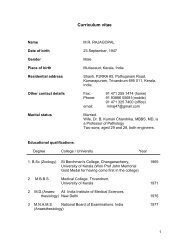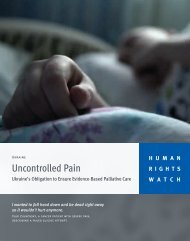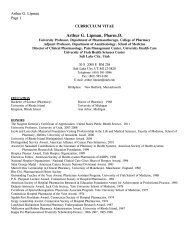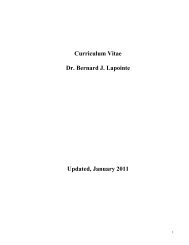INTERIGHTS Bulletin
INTERIGHTS Bulletin
INTERIGHTS Bulletin
Create successful ePaper yourself
Turn your PDF publications into a flip-book with our unique Google optimized e-Paper software.
166<br />
<strong>INTERIGHTS</strong> <strong>Bulletin</strong><br />
Volume 16 Number 4 2011<br />
Pay Up or You’ll Be Detained! Improved Health<br />
Systems and Accountability as a Response to<br />
Violations Arising in Healthcare Settings<br />
Judy Oder<br />
Introduction<br />
Human rights violations in healthcare<br />
settings are illustrative of weak health<br />
systems and the failure or lack of<br />
accountability mechanisms to deal<br />
with rights infringements across<br />
Africa. This is reflected by the<br />
emphasis placed on accountability by<br />
the Special Rapporteur on the Right of<br />
Everyone to the Enjoyment of the<br />
Highest Attainable Standard of<br />
Physical and Mental Health in stating<br />
that the analytical framework of the<br />
right to health includes effective,<br />
transparent and accessible monitoring<br />
and accountability mechanisms<br />
available at the national and<br />
international levels. 1<br />
This article seeks to analyse some of<br />
the main current challenges in<br />
healthcare settings across Africa. In so<br />
doing it looks at the principle of<br />
accountability and states’ regional and<br />
international human rights obligations<br />
in light of selected serious human<br />
rights infringements. It argues that<br />
improved healthcare systems and the<br />
entrenchment of accountability<br />
processes within these could<br />
potentially reduce the high number of<br />
violations taking place in African<br />
healthcare settings. Secondly, where<br />
violations have taken place,<br />
accountability processes should ensure<br />
the availability of remedies for victims.<br />
It concludes by arguing that minimum<br />
resources should not be used as an<br />
excuse for failing to address these<br />
serious violations, as there are<br />
measures states can take even when<br />
resources are limited.<br />
The principle of accountability in<br />
human rights law<br />
Accountability is fundamental to<br />
human rights and includes the<br />
monitoring of conduct. In the context<br />
of a health system, there must be<br />
accessible, transparent and effective<br />
mechanisms of accountability in order<br />
to understand how those with<br />
responsibilities in delivering and<br />
managing health care have discharged<br />
their duties. 2<br />
Closely linked to the principle of<br />
accountability are obligations derived<br />
from national, regional and<br />
international human rights standards.<br />
States are required to institute<br />
measures necessary to both prevent<br />
and remedy violations arising in<br />
healthcare settings. Where violations<br />
have occurred, remedies should<br />
include the investigation, prosecution<br />
and punishment of perpetrators.<br />
A crucial first step is the recognition of<br />
the right to the highest attainable<br />
standard of health in national law, as<br />
this imposes legal accountability on<br />
those with responsibilities for health<br />
systems. 3 However, legal recognition<br />
on its own, whilst important, is<br />
insufficient, since it is usually<br />
formulated in a very general manner<br />
that does not specify what is actually<br />
required of those with responsibilities.<br />
Therefore, a state must not only<br />
recognise the right to health in<br />
national law but also ensure detailed<br />
provisions clarifying what society<br />
expects by way of health-related<br />
services and facilities. 4<br />
Both regional instruments and<br />
national constitutions in Africa include<br />
specific provisions on the right to<br />
health. 5 In addition, many more<br />
national constitutional provisions<br />
outline fundamental civil rights<br />
provisions such as the right to life,<br />
freedom from inhuman and degrading<br />
treatment and the principle of equality<br />
and non-discrimination, which are<br />
applicable in the health context. The<br />
African Charter on Human and<br />
Peoples’ Rights (ACHPR) also<br />
proscribes discrimination, 6 torture<br />
and inhuman and degrading<br />
treatment. 7 States are also parties to<br />
other regional 8 and international 9<br />
human rights instruments that<br />
proscribe these types of violations.<br />
However, examination of violations<br />
that occur in health settings across the<br />
region demonstrates that states are far<br />
from respecting and implementing<br />
their right-to-health obligations.<br />
Selected violations arising in<br />
healthcare settings<br />
Detention of poor patients for failure<br />
to pay hospital bills<br />
In Kenya mothers who cannot pay<br />
their bills for maternity or other<br />
services are routinely detained. Both<br />
private and public facilities seek to<br />
pressure the patient’s relatives into<br />
paying, and public facilities will use<br />
detention to determine whether a<br />
patient is really poor enough to qualify<br />
for a waiver. Women who have recently<br />
given birth are often forced to sleep on<br />
the floor or share a bed with others, are<br />
underfed and suffer verbal abuse from<br />
staff for failing to pay. For women<br />
whose babies have died, there is a<br />
particular psychological cruelty to<br />
being detained in a maternity ward,<br />
surrounded by other mothers and their<br />
infants. 10<br />
In recent years, public hospitals in<br />
Burundi have detained hundreds of<br />
patients who were unable to pay their<br />
hospital bills, often for several weeks or<br />
months and, in one case, over a year.<br />
Detained patients without money went<br />
hungry if not fed by the charity of<br />
others. Some were forced to vacate<br />
their beds and sleep on the floor to<br />
make space for paying patients. Often,<br />
indigent patients did not receive<br />
further medical treatment once the bill<br />
had reached a large amount, even if<br />
they needed only basic follow-up care



